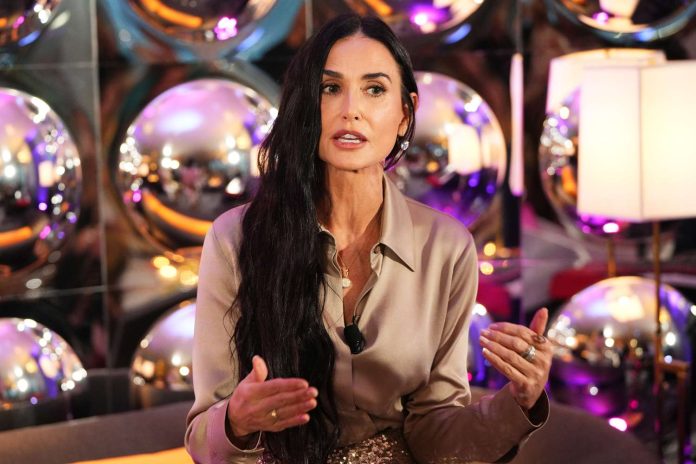November 15, 2024: Demi Moore has been candid about her experiences confronting beauty standards and societal expectations, particularly in her 40s. In a recent interview, she discussed how her role in Charlie’s Angels: Full Throttle challenged the notion that women over a certain age should not be seen as physically desirable.
Moore, who was 40 at the time of filming, reflected on how she defied conventional standards of beauty. “I was 40, which meant I shouldn’t have a body that was desirable—that’s what I challenged,” she shared. She explained that her decision to wear a two-piece swimsuit for the action-comedy film wasn’t about setting out to redefine beauty, but rather about embracing what felt authentic to her at that time in her life.

“I feel like we all have a role to play in life, to be of service, and for whatever reason, I feel like that has been something I’ve been called to do,” Moore added. “But I don’t think it would’ve been such a big deal if I hadn’t been of an age that, at that time, it was already determined that you should look like…”
Moore’s reflections also delve into the broader societal pressures women face regarding body image, especially in the 90s and early 2000s. She emphasized the unrealistic standards placed on women, particularly the expectation to be lean and thin to be considered attractive. “Self-judgment, chasing perfection, trying to rid ourselves of ‘flaws’, also feeling rejected and despair, none of this is exclusive to women,” she said, highlighting how the pursuit of an idealized appearance can lead to emotional turmoil.

In one memorable scene from Charlie’s Angels: Full Throttle, Moore’s character, Elisabeth Sparkle, is seen obsessing over her appearance in front of a mirror before a date, trying to spot and correct any perceived flaws. “We’ve all had moments where you go back and you’re trying to fix something, and you’re just making it worse to the point where you’re incapacitated,” Moore explained. “We’re seeing these small things nobody else is looking at, but we’re so hyper-focused on all that we’re not. All of us, if we start to think our value is only with how we look, then ultimately we’re going to be crushed.”

Moore has also been vocal about the judgmental culture in today’s world, particularly the anonymity offered by social media. “This is a time of great judgment, and people can anonymously judge one another in cruel ways,” she said. “I feel this kind of judgment is a reflection of someone’s own unhappiness and/or a way to boost their own sense of self.” Moore emphasized how important it is not to internalize these criticisms, choosing instead to control what value we assign to others’ opinions: “If I give it a lot of weight, value, and power, it will have it. If I don’t, it won’t.”
In The Substance, Moore takes on the role of Elisabeth once again, this time portraying a character who attempts to reverse aging using a black-market drug. The film, which explores themes of body image and the pressures women face as they age, has received critical acclaim, winning the Best Screenplay Award at the Cannes Film Festival in May. The film is another example of Moore using her platform to address complex issues around aging and self-perception, continuing to push back against the unrealistic beauty standards placed on women in the public eye.
For Moore, these reflections and roles aren’t just about defying expectations—they are about finding authenticity and encouraging others to embrace their true selves, regardless of age or societal pressures.



